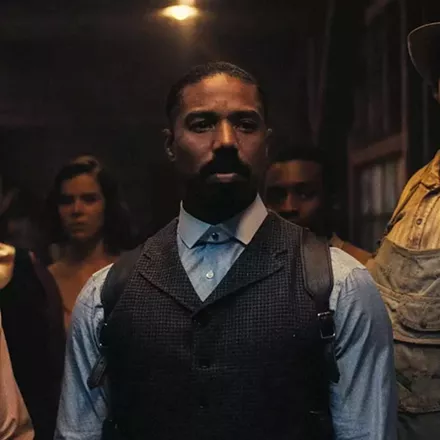
- IFC Films
In an uncertain world, it's comforting to realize that, 60 years into his career as a director, Paul Verhoeven still loves wrapping social commentary in problematic packaging. In the 1980s, when the notion of dangerously violent, fascistic policing wasn't remotely as pervasive as it is today, he served up those notions in the violent science-fiction of RoboCop. A decade later, he took on the jingoistic militarism of Robert Heinlein's Starship Troopers in a way that still confounds a lot of viewers who just focused on blowing up giant bugs. From Basic Instinct to Showgirls to 2016's Elle, provocation has seemed to be a fundamental piece of Verhoeven's playbook—and often as a way to deliver uncomfortable ideas.
The logline for Bendetta alone—it's an adaptation of a non-fiction book called Immodest Acts: The Life of a Lesbian Nun in Renaissance Italy—makes it seem like exactly the thing that will lead to pearl-clutching over its sacrilege, especially when it becomes evident that a key plot point involves the transformation of a religious statuette into a sex toy (more on which later). But Benedetta, like so many Verhoeven features, isn't as simple as its easiest-to-sell marketing points. Here's a narrative full of naughty, salacious moments that also manages to be a particularly pungent takedown of hypocritical theocracy.
The fact-based story takes place in the 17th century in the small Tuscan village of Pescia, where Benedetta Carlini enters a convent as a young girl. Eighteen years later, Benedetta (Virginie Efira) has begun to have powerful religious visions, causing concern for the abbess, Mother Felicita (Charlotte Rampling). When Benedetta intervenes to allow Bartolomea (Daphne Patakia), an illiterate young woman fleeing from her abusive father, to enter the convent, Bartolomea is made Benedetta's companion to watch out for Benedetta's increasingly erratic behavior. And that "companionship" soon evolves into something more physical.
This, naturally, is the subject matter that will make most headlines about Benedetta, since it involves stuff usually only found in search histories for fetish porn sites. Yes, as the source material's title indicates, this is about the life of a lesbian nun, and yes, the relationship between Benedetta and Bartolomea is consummated quite graphically, including the carnal application of the aforementioned figurine of the Blessed Virgin Mary. Those who are losing their minds over the previous sentence would be best served checking out now.
On the other hand, those who would respond to the same sentence with "where do I buy a ticket!" should temper their expectations. The scene in question becomes the foundation for an ecumenical trial charging Sister Benedetta with acts that would bring a death penalty, presided over by the Vatican's nuncio, Bishop Alfonso (Lambert Wilson). And that trial is itself only part of a larger exploration of power dynamics within an institution where the pose of holiness sits beside naked greed and ambition. Rampling's performance is particularly delightful as a woman who is both a believer and a pragmatist, reacting with considerably more skepticism than the other nuns when Benedetta begins to manifest stigmata wounds. As Benedetta makes what appears to be a play for Mother Felicita's leadership role, Benedetta starts to evolve into a tale of which ends justify what means, and the selectivity with which certain standards of religious purity have always been upheld.
The degree to which Verhoeven and co-screenwriter David Birke complicate Sister Benedetta's motivations feels a little bit like both a feature and a bug in her characterization. At times, it seems like her actions are manifestations of her ability to figure out how to manipulate the system in which she's trapped; at other times, she appears to be completely sincere that her every action is born of divine inspiration. The notion that prophetic messages might not conform to accepted dogma is a useful one, while still making it harder to grasp what our protagonist is really all about. That's important when some justification is needed for the more extreme material—not just the sex scenes, but an instance of torture that's rough going. Verhoeven has always pushed the boundaries, and risked the ire of those who don't like (or don't understand) what he has to say. It's just rare to find an artist so adept at tricking an audience into thinking they're just having dessert, when they're also eating their vegetables.

